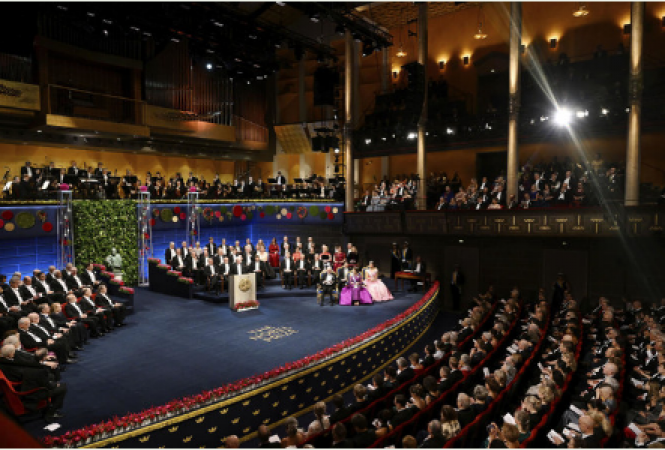
Stockholm: The Nobel Foundation, responsible for overseeing the prestigious Nobel Prize awards, has stirred debate and elicited varied reactions by canceling the invitation of the Russian ambassador, Yury Filatov, to the prize ceremony scheduled for December 10, 2023, in Stockholm.
The decision, a break from tradition, was explicitly linked to the "grave circumstances in Ukraine." While some commend the foundation for its symbolic stance against Russia's actions, others argue that the move risks politicizing the Nobel Prize—a symbol of excellence in various fields, including peace.
The Nobel Prize: A Global Symbol of Excellence
The Nobel Prize, established by the will of inventor Alfred Nobel, is an internationally acclaimed accolade awarded annually to individuals and organizations for their exceptional contributions to fields such as physics, chemistry, physiology or medicine, literature, and peace. It is regarded as one of the most prestigious honors worldwide, highlighting the significance of this year's controversy.
Also Read: IsDB's Pioneering Initiatives Transforming Coffee Farming in Indonesia
Ukraine Crisis: A Humanitarian Catastrophe
The backdrop to the Nobel Foundation's decision is the ongoing crisis in Ukraine, marked by large-scale displacement and significant loss of life. Millions have been forced from their homes, and the United Nations has described the situation as a "humanitarian catastrophe." The conflict's multifaceted nature involves political, military, and humanitarian dimensions, further complicating international responses.
The Cancellation of Ambassador Filatov's Invitation
The Nobel Foundation's traditional practice has been to extend invitations to ambassadors, including the Russian ambassador, to attend the annual prize ceremony. However, this year's decision broke from that tradition, citing the "grave circumstances in Ukraine" as the primary reason. The foundation deemed it "not appropriate" for Ambassador Filatov to be part of the ceremony.
Also Read: King Charles III Upholds Royal Tradition at Highland Games in Braemar
Mixed Reactions to the Decision
The Nobel Foundation's move has sparked a range of reactions. On one hand, some have applauded the decision as a principled stance against Russia's actions in Ukraine. It reflects the foundation's solidarity with Ukraine and its recognition of the gravity of the situation. However, there are contrasting opinions, with critics arguing that the Nobel Prize should remain apolitical and that canceling the ambassador's invitation unnecessarily introduces politics into the prestigious event.
Symbolism vs. Neutrality
The debate surrounding the Nobel Foundation's decision highlights the tension between symbolism and neutrality. The Nobel Prize embodies values of excellence, peace, and progress. In this context, the cancellation of Ambassador Filatov's invitation can be seen as a symbolic gesture—expressing solidarity with Ukraine and disapproval of Russia's role in the conflict. However, critics argue that the decision risks compromising the Nobel Prize's apolitical nature, which has been a hallmark of its prestige.
Implications for Future Nobel Prize Ceremonies
The Nobel Foundation has clarified that it will continue to monitor the situation in Ukraine and will make decisions regarding the invitations of Russian officials to future ceremonies at a later date. This approach indicates that the foundation's decision is not intended to be permanent but rather a response to the specific circumstances of this year.
The Nobel Foundation's decision to cancel the invitation of the Russian ambassador to the upcoming prize ceremony has ignited a complex debate at the intersection of symbolism and neutrality.
The foundation's desire to express solidarity with Ukraine while upholding the prestige and neutrality of the Nobel Prize reflects the delicate balance it faces.
As the crisis in Ukraine continues, the world watches how future Nobel Prize ceremonies will navigate the interplay between symbolism and the prize's traditional apolitical stance—a testament to the enduring importance and influence of this prestigious accolade on the global stage.